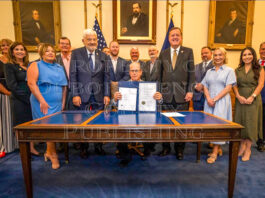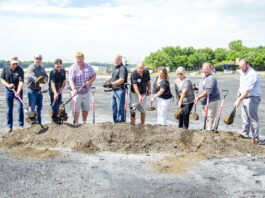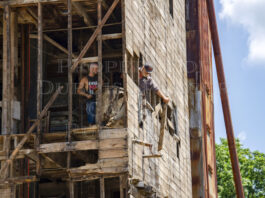While representatives from sun101.org, a 501c3 organization dedicated to wind and solar, were touting the benefits of solar and other renewable energies (see Pros and cons of solar power by Don Steen for details), not everyone was in agreement, especially those living near the solar array planned for the Grandview area.
Another solar field is in the works that would encompass the area around the town of Richland.
Jeremy Kincaid, who lives outside Richland town limits, had heard rumors of a proposed solar farm back in January, and has asked his neighboring property owner a few months ago if he was planning to lease his land for a solar field. He was told no.
Fast forward to April 26 when Kincaid drove home from work for lunch. A field survey was standing on the edge of the road. Jeremy stopped and asked, “Hey man, just out of curiosity are you surveying for solar?”
The answer was yes.
He called the neighbor back and was told there was a small chance he would lease his property for solar.
The following day, Kincaid went to the courthouse to check records and discovered a number of neighbors had signed leases with Orion Energy (the same company who originated the Grandview project and then sold it) along with other solar companies — said leases already consuming, according to Kincaid, 3,100 acres.
The project area has been given the name Sandridge Solar LLC. Allegedly the company hopes to acquire (via leases lasting 35 years) upwards of 6,000 acres.
Thanks to the carbon credits that can be transferred to carbon-burning power generators, there has been an explosion in the global energy transition to solar and wind, although the credits for this project would likely benefit energy producers in other states.
And while the sun101.org presenter insisted the solar panels will not break, the reality is they contain heavy metals including arsenic, cadmium, copper, nickel, lead and mercury — pollutants as well as carcinogens.
If the solar field is built it will perch atop the Ohio River Outwash Aquifer — a massive water resource that could provide water for all of Spencer County and beyond. This aquifer is extremely susceptible to pollution due to the lack of clay subsoils in Luce Township. And it currently provides water to the residents of Luce Township via Reo Water, and is only 13-18 feet below the surface.
A different sort of informational meeting was held last Thursday evening at the Richland Fire Station. At least 75 attendees packed into the standing-room-only space (after the chairs were filled).
Kincaid shared information he had dug up in the previous 15 days, which started with an earlier request for proposals issued by AEP seeking alternate energy sources to replace some of the coal-fired generation on which Indiana-Michigan is built.
He provided a rough outline of the area sited for solar — south of Eureka, northeast towards the water tower, around Kincaid’s house to Jeremy Eble’s, ending just north of Orchard Road, which, by the way, is in line for a wind farm. While the description may sound small, driving the area show how vast it actually is.
“The goal seems to be any and all tillable acres,” noted Kincaid.
Of special appeal to developers are the transmission lines already in place in the area.
Fears this idea engenders are both personal health and the environment, not to mention the shallow water table in Luce Township. According to one audience member solar farms are not allowed in a flood plain. In actuality, “for most areas in Indiana there are no specific requirements; however, local floodplain permits are likely. A solar panel project should ideally be installed and placed outside of the floodplain. If this cannot be avoided, the proposed development will need to meet certain criteria for proper installation.”
At the meeting touting the benefits of solar held the week prior, assurances were given there would be zero chance of a panel breaking and leaching chemicals into the soil, also that a fire would be unlikely.
A gentleman from Grandview who has been dealing with and researching solar arrays for several years (and asked to remain nameless) pointed out the fallacy of such claims. One fire in California consumed 1,200 acres and was started by two birds on a wire. Seven separate fire incidents with solar panels happened at Wal Mart and in six Amazon storage buildings — and at least one was not connected to electricity at the time.
Fire departments do not have proper equipment to douse this type of fire and “would stand outside the fence” and watch it burn, said one of the firefighters present. Not only does the aluminum melt but the smoke is too toxic.
The Grandview gentleman also said the cables buried three feet in the ground to anchor the panels are coated with a chemical and if it leaches out that chemical will pollute the soil — and water aquifer — forever.
So what can residents do?
As Kincaid pointed out this project is much further along than anyone realized. “It was just a fluke that I saw the surveyor,” Kincaid explained.
While the leases have been signed the permits have not yet been issued. When that happens it’s all over but the crying.
A contingent of affected residents plan to attend the May 16 commissioners’ meeting to ask for a 12 month moratorium on solar projects. For results of that discussion see next week’s issue.
That would just be the starting point — solutions would have to come after because the commissioners will need solutions.
An audience member noted that if a farmer wishes to add hogs, that farmer must notify adjoining property owners but there is no such requirement for solar farms. “In my opinion our freedom [to do whatever we want] ends when it affects our neighbor.”
Many other questions arose, such as who is responsible for the long-term life of the ground. That would be the proper owner since the land would be leased.
“No one is arguing renewable energy,” said Kincaid. He also did not fault those who have signed, knowing there was a lot of pressure to do so. But the one year moratorium would provide some breathing room.
As to the commissioners, as one attendee pointed out, “The commissioners are not supposed to be for the solar company, they’re supposed to be for the residents.”
Story by Kathy Tretter.




